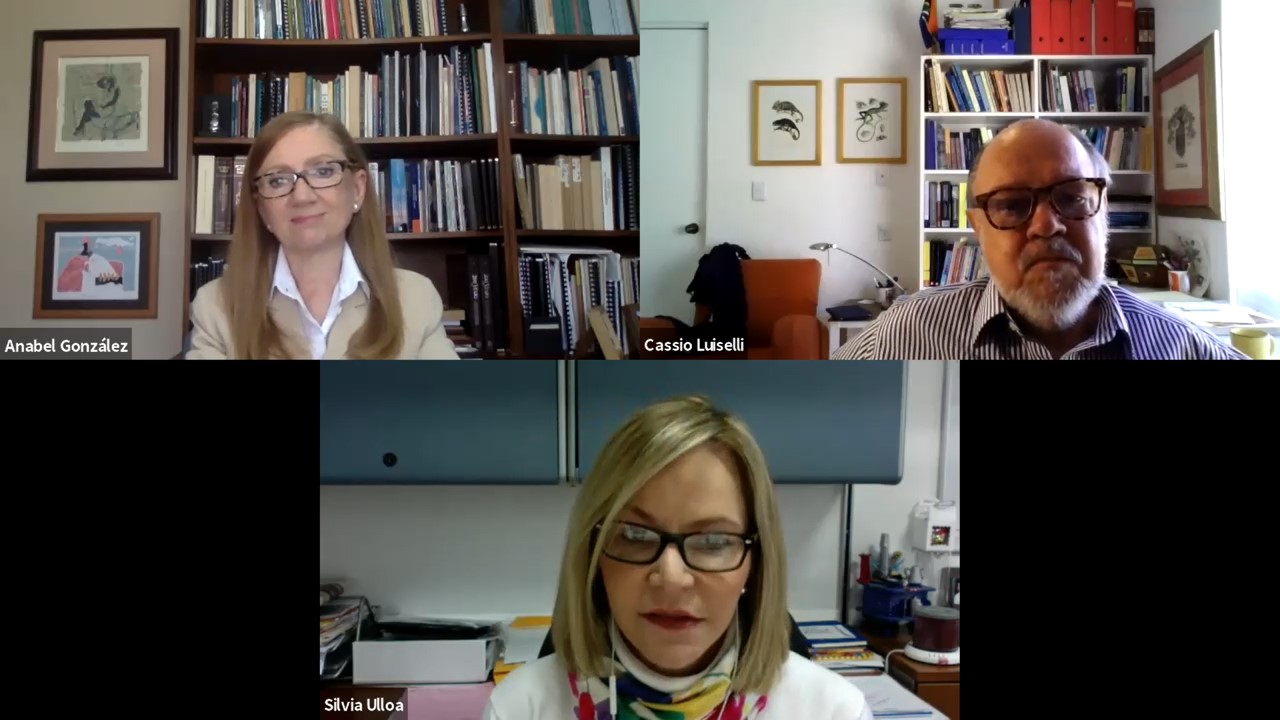Specialists, Anabel González and Cassio Luiselli, analyzed this scenario during an IICA webinar to discuss the effects on international trade and sanitary regulations post-Covid-19.

San Jose, 22 May 2020 (IICA). International cooperation and regional integration will be critical to ensuring that value chains continue to run smoothly and distribution channels remain open, while driving the recovery of global trade, in the fallout from the Covid-19 pandemic.
Anabel González, former Minister of Foreign Trade of Costa Rica, and Cassio Luiselli, the former Advisor on agricultural development to the President of Mexico, stressed the importance of these issues in a webinar organized by the Inter-American Institute for Cooperation on Agriculture (IICA), focusing on repercussions on international trade and sanitary regulations in the wake of the pandemic.
González, who is a former Senior Director of the World Bank’s Global Practice on Trade and Competitiveness, maintained that, “International cooperation and regional integration are needed to tackle the wave of the pandemic in which we find ourselves, but also to recover from the crisis, keep the supply chains functioning and the trade channels open, while guaranteeing continued financing of trade, facilitating the expansion of investment groups and rebuilding the future”.
The experts both agreed that fostering this cooperation and integration would hinge on strengthening trade governance and the role of organizations, such as the World Trade Organization (WTO), and on promoting dialogue between existing institutions and other key actors. IICA, in their opinion, should play a key role in this effort.
“In order to maintain trade operations, we will have to revitalize our institutions”, said Cassio Luiselli. “We must increase cooperation and dialogue, including with the private sector, and IICA has a strategic and critical part to play, by connecting the dots”.
Anabel González then proposed that Latin American countries should lead the way in this area, given the importance of agricultural trade to the region. “I would like to see IICA supporting countries in developing a solid institutional environment that facilitates the flow of trade”, she added.
González and Luiselli suggested that some of the repercussions of Covid-19 on trade will be non-tariff and administrative barriers; export restrictions, through the closure of borders; and increasingly restrictive sanitary requirements.
They explained that although some countries have introduced tariff reduction policies and implemented green channels to expedite the entry of agrifood products, others have opted to restrict exports, which is a risk that could trigger a food crisis, in addition to the health and economic emergency.
González insisted that, “For trade to contribute to food security, it cannot be subject to barriers. Restrictions discourage investment and production, and usually lead to rising prices, inviting other countries to retaliate. Therefore, in the short-term, this may seem like an appropriate measure, but it is counter-productive in the medium-term”.
Repercussions on agriculture
The specialists pointed out that due to social distancing, the sector has experienced disruptions in transportation, logistics and the availability of labor to reap crops, while suffering from limited access to inputs and fertilizers.
They stressed that Latin American countries would have to diversify their production structure, even as they attempt to tackle the related challenges.
“The sector faces significant challenges, such as the significant group of small and medium-scale producers who are not fully integrated into the trade scene, with no access to technology and best practices”, González warned. “They must connect with others, in order to become indirect exporters, and we must encourage them in the use of certified seeds and membership in associative enterprises, while promoting their knowledge and use of digital trade platforms”.
The panelists indicated that 20% of the world’s population depends on international trade, and therefore we must drive trade, if we are to avoid the grim economic landscape that is on the horizon: -3% growth in the global economy in 2020; a fall-off in trade of between 3% and 13%; a 30 to 40% drop in foreign investment and the approximately 50 million people who could fall below the extreme poverty line.
The next seminar in the IICA series will be held on Tuesday, 26 May at 4 p.m. (Costa Rica time), and it will focus on food supply, family farming and short circuits post-Covid-19.
It will be livestreamed from the Institute’s Virtual Conference Room and its official Facebook, YouTube and Instagram pages.
The presentations from previous seminars are available for comments and discussion on the IICA Blog – “Cultivating Tomorrow’ Agriculture Today”: https://blog.iica.int/en.
Upcoming seminars:
Food supply, family farming and short circuits post-Covid-19 \ Tuesday, 26 May
Presenters:
Graciela Fernández, President of Cooperatives of the Americas.
Álvaro Ramos, former Minister of Agriculture and of Foreign Affairs, Uruguay.
Livestream from FB Live, YouTube and the IICA Virtual Conference Room: 4:00 p. m. Costa Rica time.
Post-Covid-19 from the perspective of Caribbean countries | Thursday, 28 May
Livestream from FB Live, YouTube and the IICA Virtual Conference Room: 4:00 p. m. Costa Rica time.
Presenters:
Chelston Brathwaite, former Director General of IICA.
James Fletcher, former Minister of Energy of Saint Lucia.
Livestream from FB Live, YouTube and the IICA Virtual Conference Room: 4:00 p. m. Costa Rica time.
More information:
Federico Villarreal, Director of Technical Cooperation, IICA.











